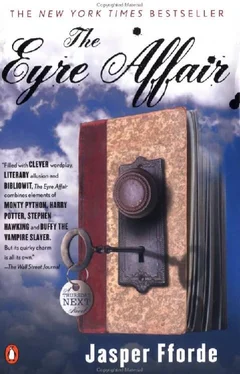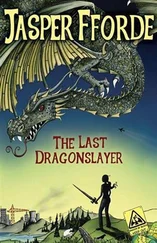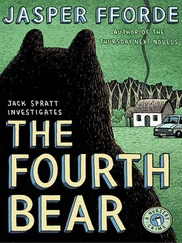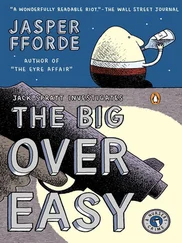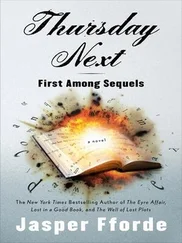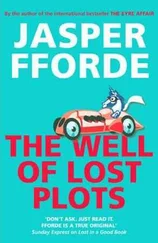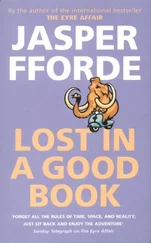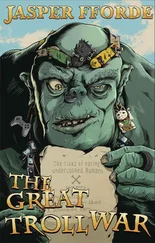‘But it didn’t affect the outcome of either battle,’ I asserted. ‘We still won on both occasions!’
‘I never said they were good at it.’
‘That’s ludicrous!’ I scoffed. ‘I suppose you think the same revisionists had King Harold killed in 1066 to assist the Norman invasion!’
But Dad wasn’t laughing. He replied with some surprise: ‘Harold? Killed? How?’
‘An arrow, Dad. In his eye.’
‘English or French?’
‘History doesn’t relate,’ I replied, annoyed at his bizarre line of questioning.
‘In his eye, you say—? Time is out of joint,’ he muttered, scribbling another note.
‘What’s out of joint?’ I asked, not quite hearing him. ‘Nothing, nothing. Good job I was born to set it right—‘
‘Hamlet?’ I asked, recognising the quotation. He ignored me, finished writing and snapped the notebook shut, then placed his fingertips on his temples and rubbed them absently for a moment. The world joggled forward a second and refroze as he did so. He looked about nervously.
‘They’re on to me. Thanks for your help, Sweetpea. When you see your mother, tell her she makes the torches burn brighter—and don’t forget to try and dissuade her from painting the bedroom.’
‘Any colour but mauve, right?’
‘Right.’ He smiled at me and touched my face. I felt my eyes moisten; these visits were all too short. He sensed my sadness and smiled the sort of smile any child would want to receive from their father. Then he spoke:
‘For I dipped into the past, far as SpecOps twelve could see –‘
He paused and I finished the quote, part of an old ChronoGuard song Dad used to sing to me when I was a child.
‘— saw a vision of the world and all the options there could be!’
And then he was gone. The world rippled as the clock started again. The barman finished his sentence, the birds flew on to their nests, the television came back on with a nauseating ad for SmileyBurgers, and over the road the cyclist met the asphalt with a thud.
Everything carried on as normal. No one except myself had seen Dad come or go.
I ordered a crab sandwich and munched on it absently while sipping from a Mocha that seemed to be taking an age to cool down. There weren’t a lot of customers and Stanford, the owner, was busy washing up some cups. I put down my paper to watch the TV when the Toad News Network logo came up.
Toad News was the biggest news network in Europe. Run by the Goliath Corporation, it was a twenty-four-hour service with up-to-date reports that the national news services couldn’t possibly hope to match. Goliath gave it finance and stability, but also a slightly suspicious air. No one liked the Corporation’s pernicious hold on the nation, and the Toad News Network received more than its fair share of criticism, despite repeated denials that the parent company called the shots.
‘This,’ boomed the announcer above the swirling music, ‘is the Toad News Network. The Toad, bringing you News Global, News Updates, News NOW!’
The lights came up on the anchorwoman, who smiled into the camera.
‘This is the midday news on Monday, 6th May 1985, and this is Alexandria Belfridge reading it. The Crimean peninsula,’ she announced, ‘has again come under scrutiny this week as the United Nations passed resolution PN17296, insisting that England and the Imperial Russian Government open negotiations concerning sovereignty. As the Crimean War enters its one hundred and thirty-first year, pressure groups both at home and abroad are pushing for a peaceful end to hostilities.’
I closed my eyes and groaned quietly to myself. I had been out there doing my patriotic duty in ‘73 and had seen the truth of warfare beyond the pomp and glory for myself. The heat, the cold, the fear, the death. The announcer spoke on, her voice edged with jingoism.
‘When the English forces ejected the Russians from their last toehold on the peninsula in 1975, it was seen as a major triumph against overwhelming odds. However, a state of deadlock has been maintained since those days and the country’s mood was summed up last week by Sir Gordon Duff-Rolecks at an anti-war rally in Trafalgar Square.’
The programme cut to some footage of a large and mainly peaceful demonstration in central London. Duff-Rolecks was standing on a podium and giving a speech in front of a large and untidy nest of microphones.
‘What began as an excuse to curb Russia’s expansionism in 1854,’ intoned the MP, ‘has collapsed over the years into nothing more than an exercise to maintain the nation’s pride.’
But I wasn’t listening. I’d heard it all before a zillion times. I took another sip of coffee as sweat prickled my scalp. The TV showed stock footage of the peninsula as Duff-Rolecks spoke: Sebastapol, a heavily fortified English garrison town with little remaining of its architectural and historical heritage. Whenever I saw these pictures the smell of cordite and the crack of exploding shells filled my head. I instinctively stroked the only outward mark from the campaign I had—a small raised scar on my chin.
Others had not been so lucky. Nothing had changed. The war had ground on.
‘It’s all bullshit, Thursday,’ said a gravely voice close at hand.
It was Stanford, the cafe owner. Like me he was a veteran of the Crimea, but from an earlier campaign. Unlike me he had lost more than just his innocence and some good friends; he lumbered around on two tin legs and still had enough shrapnel in his body to make half a dozen baked bean tins.
‘The Crimea has got sod all to do with the United Nations.’
He liked to talk about the Crimea with me despite our opposing views. No one else really wanted to. Soldiers involved in the on-going dispute with Wales had more kudos; Crimean personnel on leave usually left their uniforms in the wardrobe.
‘I suppose not,’ I replied non-committally, staring out of the window to where I could see a Crimean veteran begging at a street corner, reciting Longfellow from memory for a couple of pennies.
‘Makes all those lives seem wasted if we give it back now,’ added Stanford gruffly. ‘We’ve been there since 1854. It belongs to us. You might as well say we should give the Isle of Wight back to the French.’
‘We did give the Isle of Wight back to the French,’ I replied patiently; Stanford’s grasp of current affairs was generally confined to First Division pelota and the love life of actress Lola Vavoom.
‘Oh yes,’ he muttered, brow knitted. ‘We did, didn’t we? Well, we shouldn’t have. And who do the UN think they are?’
‘I don’t know but if the killing stops they’ve got my vote, Stan.’
The barkeeper shook his head sadly as Duff-Rolecks concluded his speech:
“… there can be little doubt that the Czar Romanov Alexei IV does have overwhelming rights to sovereignty of the peninsula and I for one look forward to the day when we can withdraw our troops from what can only be described as an incalculable waste of human life and resources.’
The Toad News anchorwoman came back on and moved to another item—the government was to raise the duty on cheese to 83 per cent, an unpopular move that would doubtless have the more militant citizens picketing cheese shops.
‘The Ruskies could stop it tomorrow if they pulled out!’ said Stanford belligerently.
It wasn’t an argument and he and I both knew it. There was nothing left of the peninsula that would be worth owning whoever won. The only stretch of land that hadn’t been churned to a pulp by artillery bombardment was heavily mined. Historically and morally the Crimea belonged to Imperial Russia; that was all there was to it.
The next news item was about a border skirmish with the Socialist Republic of Wales; no one hurt, just a few shots exchanged across the River Wye near Hay. Typically rambunctious, the youthful President-for-Life Owain Glyndwr VII had blamed England’s imperialist yearnings for a unified Britain; equally typically, Parliament had not so much as even made a statement about the incident. The news ground on, but I wasn’t really paying attention. A new fusion plant had opened in Dungeness and the Prime Minister had been there to open it. He grinned dutifully as the flashbulbs went off. I returned to my paper and read a story about a parliamentary bill to remove the dodo’s Protected Species status after their staggering increase in numbers; but I couldn’t concentrate. The Crimea had filled my mind with its unwelcome memories. It was lucky for me that my pager bleeped and brought with it a much-needed reality check. I tossed a few notes on the counter and sprinted out of the door as the Toad News anchorwoman sombrely announced that a young surrealist had been killed—stabbed to death by a gang adhering to a radical school of French impressionists.
Читать дальше
